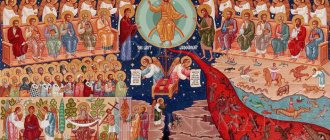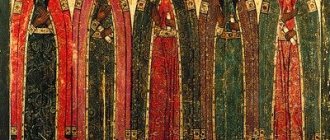It is believed that every bad deed of a person is taken into account and he will certainly be punished for it. Believers believe that only a righteous life will help them avoid punishment and end up in Paradise. The fate of people will be decided at the Last Judgment, but when this will happen is unknown.
What does this mean, the Last Judgment?
The judgment that will affect all people (living and dead) is called “terrible.” It will happen before Jesus Christ comes to earth for the second time. It is believed that dead souls will be resurrected and the living will be changed. Each person will receive an eternal fate for their actions, and sins at the Last Judgment will come to the fore. Many people mistakenly believe that the soul appears before the Lord on the fortieth day after its death, when a decision is made whether it will go to Heaven or Hell. This is not a trial, but simply a distribution of the dead who will wait for “time X.”
Last Judgment in Christianity
In the Old Testament, the idea of the Last Judgment is presented as the “day of Yahweh” (one of the names of God in Judaism and Christianity). On this day there will be a celebration of victory over earthly enemies. After the belief that the dead could be resurrected began to spread, the “day of Yahweh” began to be perceived as the Last Judgment. The New Testament states that the Last Judgment is the event when the Son of God will descend to earth, sit on the throne and all nations will appear before him. All people will be divided, and the justified will stand on the right hand, and the condemned on the left.
- Jesus will entrust part of his powers to the righteous, for example, the apostles.
- People will be judged not only for good and evil deeds, but also for every idle word.
- The Holy Fathers said about the Last Judgment that there is a “memory of the heart” in which all life is imprinted, not only external, but also internal.
Why do Christians call God's judgment “terrible”?
There are several names for this event, such as the great day of the Lord or the day of God's wrath. The Last Judgment after death is so called not because God will appear before people in a terrifying guise; on the contrary, he will be surrounded by the splendor of his glory and greatness, which will cause fear in many.
- The name “terrible” is due to the fact that on this day sinners will tremble because all their sins will be made public and they will have to answer for them.
- It is also frightening that everyone will be judged publicly in front of the whole world, so it will not be possible to evade the truth.
- Fear also arises due to the fact that the sinner will receive his punishment not for some time, but forever.
Apostle. What does this word mean?
This term has Greek roots. In order to answer the question “what is an apostle?”, it is necessary to know its original translation. Translated from Greek, the word "apostle" means "messenger", "disciple", "adherent" or "follower". In the context of gospel history, the word “apostle” was used to describe the disciples of Jesus Christ who spread his wisdom. Initially there were 12 of them: Peter, Andrew, James and John Zebedee, James Alphaeus, Bartholomew, Philip, Matthew, Simon the Zealot, Thomas, Judas Jacob and Judas Iscariot. After the betrayal and death of the latter, Matthew was chosen as the new apostle, so that the total number of disciples would again be 12.
After these events, Jesus Christ chose 70 followers, whose names are not mentioned in the Gospel. Among them are Mark, Luke, and also Paul, who became acquainted with the teachings of the Lord after his death and resurrection. Despite the fact that Paul was not initially associated with Christ and those around him, by his actions he fully demonstrated the true meaning of the word “apostle.” Thanks to him, Christian teaching spread widely throughout the Roman Empire.
In Orthodoxy, apostles are also called other saints who were involved in spreading the Gospel in pagan states and tribes (for example, St. Gregory the Illuminator, Apostle of Armenia). In church literature, such people bear the title “equal to the apostles.”
But the above facts are not the only explanations of what an apostle is. In church terminology, this word also means a book that contains part of the Gospel and the Epistles of the Holy Apostles.
Where are the souls of the dead before the Last Judgment?
Since no one has ever been able to return from the other world, all information regarding the afterlife is speculation. Posthumous ordeals of the soul and the Last Judgment of God are presented in many church scriptures. It is believed that for 40 days after death, the soul is on earth, living through different periods, thereby preparing to meet the Lord. When figuring out where souls are before the Last Judgment, it is worth saying that God, looking through the lived life of each deceased person, determines where he will be in Heaven or Hell.
The World History
Remember what Emperor Nero accused Christians of. To what torment did he condemn them? Did he achieve his goal?
The founder of a new religion - Christianity - was a traveling preacher named Jesus, originally from Palestine. There are stories about him from his students, in which truth and fiction are intertwined.
1. What did the first Christians say about the life of Jesus? Almost two thousand years ago, in the cities and villages of Palestine, Syria and Asia Minor, which were under the rule of Rome, people appeared who called themselves disciples of the Son of God - Jesus.
Palestine in the time of Jesus Christ.
"Sons of Light" from Qumran
Long before the birth of Jesus, people appeared in Palestine who also expected the establishment of a kingdom of goodness and justice on earth. They went into the desert near the Dead Sea and founded a settlement there. These people had common property, called themselves “poor” and “sons of light”, and everyone else - “sons of darkness”. They called for hatred of the “sons of darkness” and believed that a worldwide battle would soon break out in which the “sons of light” would triumph over evil. They kept their teachings secret. The settlement of the “sons of light” was excavated by archaeologists in the area now called Qumran. During excavations, leather scrolls with texts from the Bible and writings of the “sons of light” were found.
Jesus knew about the “sons of light,” but his teaching did not call for hatred. It was addressed to all people. “What am I telling you in the dark,” he inspired the students. “Speak in the light, and whatever you hear in your ears, proclaim to everyone from the rooftops.”
Part of a manuscript from Qumran.
They argued that Jesus' father was the God Yahweh, whom the Jews worshiped, and his mother was Mary, a poor resident of the Palestinian city of Nazareth. When the time came for Mary to give birth, she was not at home, but in the city of Bethlehem. At the moment of Jesus' birth, a star lit up in the sky. Along this star, sages from distant countries and simple shepherds came to worship the Divine Infant.
When Jesus grew up, he did not stay in Nazareth. Jesus gathered his disciples around him and walked with them throughout Palestine, performing miracles: he healed the sick and crippled, raised the dead, fed thousands of people with five loaves. Jesus said: the end of the world, mired in evil and injustice, is approaching. The day of God's judgment of all people will soon come. This will be the Last Judgment: the sun will darken, the moon will not give light, and the stars will fall from the sky. All who have not repented of their bad deeds, all who worship false gods, all evildoers will be punished. But for those who believed in Jesus, who suffered and were humiliated, the Kingdom of God will come on earth - the kingdom of goodness and justice.
Jesus' Teachings in the Sermon on the Mount
Christians hold the four Gospels sacred. According to legend, their authors were: Matthew and John - disciples of Jesus, Mark - a companion on the wanderings of the Apostle Peter and Luke - a companion of the Apostle Paul. In the Gospel of Matthew, Jesus says:
Blessed are those who mourn, for they will be comforted.
Give to the one who asks from you, and do not turn away from the one who wants to borrow from you.
You have heard that it was said: an eye for an eye and a tooth for a tooth. But I tell you: do not resist evil. But whoever strikes you on your right cheek, turn the other to him too.
Love your enemies, bless those who curse you, pray for those who abuse you.
If you forgive people their sins, then your Heavenly Father will also forgive you.
Judge not lest ye be judged.
Ask, and it shall be given you; seek, and you will find: knock, and it will be opened to you.
And in everything that you want people to do to you, do so to them.
Apostle Paul. Ancient image.
Jesus had twelve closest disciples. He also had enemies. The priests of the temple of Yahweh in Jerusalem were indignant at the fact that an ordinary person was called the Son of God. And for the Romans, Jesus was just a troublemaker, in whose speeches they saw an undermining of the emperor's power. One of the twelve disciples named Judas agreed to betray Jesus for thirty silver coins. At night, Judas led the guards to the outskirts of Jerusalem, where Jesus was with his disciples. Judas approached Jesus and kissed him as if out of love. By this conventional sign, the guards identified Jesus in the darkness of the night. He was captured, tortured and mocked in every possible way. The Roman authorities condemned Jesus to a shameful execution - crucifixion. Jesus' friends took the dead body down from the cross and buried it. But on the third day the tomb turned out to be empty... After a little time, the resurrected (that is, becoming alive again) Jesus appeared to the disciples. He sent them to spread his teachings to different countries. Therefore, Jesus’ disciples began to be called apostles (translated from Greek as messengers). The apostles believed that Jesus had ascended to heaven and that the day would come when he would return to carry out the Last Judgment.
Jerusalem. On the left is the temple of Yahweh. Reconstruction.
Stories about Jesus were written down by the early Christians, these records are called the Gospels. The word "gospel" in Greek means "good news."
2. Who were the first Christians? Admirers of Jesus called him Christ (by this word they meant God's chosen one), and themselves - Christians. The poor and slaves, widows, orphans, cripples - all those for whom life was especially difficult - became Christians.
Jesus and his disciples were Jews, but gradually more and more people of other nationalities appeared among Christians: Greeks, Syrians, Egyptians, Romans, Gauls. Christians proclaimed that everyone is equal before God: Greeks and Jews, slaves and free, men and women.
Every believer can enter the Kingdom of God if he is merciful, forgives his offenders and does good deeds.
Apostle Paul: from Judaism to Christianity
Paul was at first an enemy of Christians, he argued fiercely with them and even participated in their beating by a hostile crowd.
One day Paul went to the city of Damascus to massacre the Christians living there. Suddenly he saw a blinding light, lost his sight, fell and heard a voice: “I am Jesus, whom you are persecuting. Get up and go to the city." In Damascus, one of the Christians healed Paul and restored his sight. From that time on, Paul believed in Christ and told everywhere that Jesus was the Son of God. Opponents of the Christians plotted to kill Paul and began to guard him at the city gates so that he would not escape. Then Paul's friends put him in a basket and secretly lowered him from the defensive walls on ropes. Paul began to be called an apostle because he converted many people of different nations to the Christian faith.
Paul died in Rome during the execution of Christians under Nero.
1. Good Shepherd (shepherd). Ancient statue.
2. Evangelist carrying the cross and the Gospel. Ancient mosaic1.
The Roman authorities were hostile to Christians who did not want to worship the statues of emperors. Christians were expelled from cities, beaten with sticks, thrown into prison, and sentenced to death. Christians to each other
From a letter from the governor of the province, Pliny the Younger, they provided assistance to Emperor Trajan, brought food to those imprisoned, hid those persecuted by the Romans, and cared for the sick and old. Christians gathered in the houses of fellow believers, in deserted and safe places. There they read the Gospels aloud and chose priests to lead their prayers.
Those Christians, Vladyka, who do not want to renounce Christ, I sent to execution. I released those who denied that they were Christians when they made a sacrifice in front of your image and blasphemed Christ. True Christians, they say, cannot be forced to do such things.
From Emperor Trajan's reply to Pliny
You did the right thing by investigating those who were reported as Christians. There is no need to look for them: if they are denounced and they are exposed, they should be punished. But those who deny that they are Christians and pray to our gods should be pardoned.
An anonymous denunciation should not be taken into account.
1 Mosaic is an image made from multi-colored pieces of glass.
3. Belief in different destinies of people after death. Christians were waiting for the Second Coming of Jesus, but years passed, and the Kingdom of God on earth still did not come. They were imbued with the belief that even before the Last Judgment they would be rewarded for all their suffering after death. Christians recalled the edifying story about Lazarus and the rich man, once told by Jesus.
There lived a rich man. He dressed in purple clothes and spent every day in feasts and fun. There also lived a beggar named Lazarus, all in rags and covered with sores. He lay at the gate of the rich man's house, picking up pieces that had fallen from the banquet table. And stray dogs licked his sores.
A beggar died and went to heaven. The rich man also died. He was tortured in hell. And Lazarus was delivered from them! The rich man raised his eyes and saw Lazarus in the distance, and next to him the ancestor Abraham. The rich man prayed and began to ask Lazarus to dip the end of his finger in water: “Let it cool my tongue, for I am tormented in the fire!” But Abraham answered the rich man: “No! Remember that you have already received good things in life, and Lazarus received evil things. Now he is consoled here, and you suffer.”
Christians believed that the souls of people who suffered during life would go to heaven after death, where they would be blissful.
Explain the meaning of the words: Christians, Gospel, apostle, priest, Second Coming, Last Judgment.
Test yourself. 1. In which Mediterranean country did faith in Jesus Christ originate? Which state was this country under? 2. What did Jesus Christ teach? 3. What hope did the edifying story of Lazarus and the rich man raise for Christians? 4. Why were the Roman authorities hostile to Christians? Why did Christians refuse to worship the Roman emperor as a god? 5. How did the popular expressions “Judas the traitor” and “thirty pieces of silver” come about? In what cases are they used today?
Work with the map “Palestine in the Time of Jesus Christ” (see p. 269). Find cities associated with the life of Jesus Christ.
Describe the drawing “Gathering of the First Christians” (see p. 268). Guess what the priest tells the believers about.
- Previous
- Table of contents
- Next
What does the Last Judgment look like?
The saints who wrote the sacred books from the words of the Lord were not given detailed information about the Last Judgment. The Almighty showed only the essence of what will happen. The description of the Last Judgment can be obtained from the icon of the same name. The image was formed in Byzantium in the eighth century and was recognized as canonical. The plot was taken from the Gospel, the Apocalypse and various ancient books. The revelations of John the Theologian and the Prophet Daniel were of great importance. The Last Judgment icon has three registers and each has its own place.
- Traditionally, at the top of the image is Jesus, who is surrounded on both sides by the apostles and they take direct part in the process.
- Below it is the throne - the throne of judges, on which there is a spear, a cane, a sponge and the Gospel.
- Below there are trumpeting angels who call everyone to the event.
- The lower part of the icon shows what will happen to people who were righteous and sinners.
- On the right side there are people who have done good deeds and they will go to Paradise, as well as the Mother of God, angels and Paradise.
- On the other side, Hell is presented with sinners, demons and Satan.
Various sources describe other details of the Last Judgment. Each person will see his life in the smallest detail, and not only from his own side, but also through the eyes of the people around him. He will understand which actions were good and which were bad. The assessment will be carried out using scales, so good deeds will be placed on one scale, and evil deeds on the other.
The original meaning of the concept "Gospel"
In addition to the question “what is an apostle?”, an equally common question is about the meaning of the term “Gospel”. Like the previous word, it is of Greek origin and literally means positive and good news. In ancient Greece, the word "Gospel" was used in the following cases:
- To describe a gift to a messenger who brought good news.
- To describe a sacrifice made to ancient deities in honor of receiving positive news.
- To describe positive news.
Who is present at the Last Judgment?
During the decision-making process, a person will not be alone with the Lord, since the action will be open and global. The Last Judgment will be carried out by the entire Holy Trinity, but it will be unfolded only by the hypostasis of the Son of God in the person of Christ. As for the Father and the Holy Spirit, they will take part in the process, but from a passive side. When the day of God's Last Judgment comes, everyone will bear responsibility together with their guardian angels and close dead and living relatives.
What will happen to sinners after the Last Judgment?
The Word of God depicts several types of torment to which people leading a sinful life will be subjected.
- Sinners will be removed from the Lord and cursed by him, which will be a terrible punishment. As a result, they will be tormented by their soul's thirst to get closer to God.
- When figuring out what awaits people after the Last Judgment, it is worth pointing out that sinners will be deprived of all the benefits of the kingdom of heaven.
- People who have done bad things will be sent to the abyss, a place that demons fear.
- Sinners will be constantly tormented by the memories of their lives, which they destroyed with their own words. They will be tormented by conscience and regret that nothing can be changed.
- Holy Scripture contains descriptions of external torment in the form of a worm that does not die and fire that never goes out. Sinners will experience weeping, gnashing of teeth and despair.
What was the Gospel about - the good, joyful news of the New Testament?
Today, many Christians believe that the gospel was that Jesus died on Calvary and through His substitutionary sacrifice the sins of the people were forgiven. This is true? Of course it is! But weren’t people’s sins forgiven in Old Testament times? Did God love people less and forgive them less often in Old Testament times? Let's look at just a few Old Testament tests on this topic, although there are many:
Mich. 7:18 Who is God like You, who forgives iniquity and does not impute transgression to the remnant of Your inheritance? He is not always angry, because He loves to have mercy.
Ps. 129:3,4 If You, Lord, notice iniquities, Lord! who can resist? But with You is forgiveness, let them revere You.
Ps. 31.1-5 Psalm of David. Teaching. Blessed is he whose iniquities are forgiven and whose sins are covered! Blessed is the man to whom the Lord does not impute sin, and in whose spirit there is no guile! When I was silent, my bones became worn out from my daily groaning, for day and night Your hand was heavy upon me; My freshness disappeared, like in a summer drought. But I revealed my sin to You and did not hide my iniquity; I said, “I will confess my crimes to the Lord,” and You took away from me the guilt of my sin.
So, if in the Old Testament times there was God’s forgiveness, then was it only the message of forgiveness that contained the Gospel? Apparently not.
Let's remember the phrases where the word Gospel was used in the New Testament.
Matt.4:17,23 From that time Jesus began to preach and say: Repent, for the kingdom of heaven is at hand. And Jesus walked throughout all Galilee, teaching in their synagogues and preaching the Gospel
Kingdoms.
Attention! We see that Jesus preached the Gospel. But did He constantly tell the people that He came to die for the sins of people on the cross? From the text of the New Testament it is clearly clear that even the disciples did not fully understand the essence - the purpose of Christ's mission. For example, remember how Peter did not let Him die. And when Jesus was resurrected, the disciples hoped that He had come to restore the Kingdom to Israel. And this is understandable, because Jesus did not preach in every sermon that He came to die for their sins. But, nevertheless, the sermons of Christ are called the Gospel in the New Testament. Or we must accept that Jesus constantly spoke in his sermons about his death for the sins of people, which contradicts the text of the New Testament. Or we must understand that the gospel means something more than just forgiveness and redemption. Then what else is the gospel about if not only the forgiveness of sins through the death of Christ? What gospel did Jesus preach?
Let's see what words stand next to the word Gospel? "Gospel of the Kingdom"! That is, Jesus brought the Gospel - the good news of the Kingdom of Heaven! And next to the word Gospel, as we have seen, there is a call to repentance.
Let's see how Mark described Christ's preaching.
Mark 1:14,15 Jesus came to Galilee preaching the Gospel
Kingdom of God and saying that THE TIME IS FULFILLED and the Kingdom of God IS COMING NEAR: repent and believe in the Gospel.
Here we see the same thing: Jesus brought good, joyful news - i.e. The Gospel is about the fact that the time has come and the Kingdom of the Lord is approaching and we need to repent, that is, change our life. Let us remember that in the world at that time the message of the Gospel announced a new King and promised people joyful events and a happy life in the new kingdom. And in connection with Jesus the word Gospel
stands next to the news that the Kingdom of Heaven is at hand. And Jesus also promised happiness in God’s Kingdom, and called for repentance in order to enter this Kingdom and live happily in it.
By the way, do the last words of Christ that we read remind you of anything? John the Baptist said practically the same thing, foreshadowing the ministry of Christ:
Matt. 3:1 In those days John the Baptist comes and preaches in the wilderness of Judea 2 and says, Repent, for the kingdom of heaven is at hand.
So what was the Gospel—the good news—of the Kingdom of God? The answer is simple: that John the Baptist and Jesus brought to people in their sermons the correct teaching of God, the fulfillment of which brought people closer to the Kingdom of Heaven. Jesus and John called on people to repent and change their lives in order to inherit the Kingdom of Heaven. And those who misunderstood God's teaching, Jesus warned that they would not enter the Kingdom of Heaven. Remember how Jesus warned the Pharisees and scribes in the Sermon on the Mount:
Matthew 5:20,22 I tell you, unless your righteousness exceeds the righteousness of the scribes and Pharisees, you will not enter the kingdom of heaven. (And then he gives examples) ... whoever says to his brother, “You are foolish,” is subject to fiery hell.
Let's also look at the words of the New Testament about the preaching of Christ and the Gospel: Let's look at one of the last sermons of Christ about the end of time:
Matthew 24:14 And THIS gospel
Kingdoms throughout the whole world as a testimony to all nations; and then the end will come.
What is Christ talking about here? Of course, about the end of time. The end will come when the Gospel of the Kingdom, that is, translated as the joyful news of the Kingdom of the Lord, will be preached to the whole world. Will this Gospel at the end of time be significantly different from the Gospel that Christ brought? No! Look exactly how Jesus said: THIS Gospel will be preached, that is, this same Gospel. And remember what instruction Jesus gave when parting with his disciples:
Matt. 28:19,20 Go ye therefore and make disciples of all nations, baptizing them in the name of the Father and of the Son and of the Holy Spirit, teaching them to observe ALL THAT I COMMANDED YOU.
That is, Christians should teach not something else, but carry the same Gospel that Christ brought!
Parable of the Last Judgment
Jesus Christ spoke to believers about the Last Judgment so that they would know what awaits them if they deviate from the righteous path.
- When the Son of God comes to earth with the holy angels, he will sit on the throne of his own glory. All nations will gather before him and Jesus will separate the good people from the bad.
- On the night of the Last Judgment, the Son of God will ask for every action, claiming that all bad actions committed towards other people were done to him.
- After this, the judge will ask why they did not help those in need when they demanded support, and the sinners will be punished.
- Good people who led righteous lives will be sent to Heaven.










